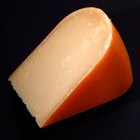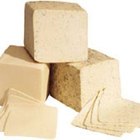
Jupiterimages/Comstock/Getty Images
Dairy shelves in grocery stores are lined with a variety of cheeses. Some are fresh; others are aged. The biggest difference between them is that fresh cheese does not go through a ripening process, while aged cheeses sometimes have been cured six months or more.
Fresh Cheese
A salad plate with a side of cottage cheese, a bagel spread with cream cheese or lasagna made with ricotta all incorporate fresh cheeses. Also, cheeses with a short ripening time, such as feta cheese, fall into the fresh cheese category.
Mozzarella
This popular cheese used in Italian dishes also can be purchased fresh. Sometimes made with buffalo milk, fresh balls of mozzarella have a high moisture content, are stored in water and generally are eaten the same day they are made.
Popular Aged Cheeses
Unlike their softer, fresher counterparts, aged cheeses tend to have a firm texture. parmigiano reggiano and pecorino both are frequently used aged cheeses, as are Swiss, jack and cheddar cheeses.
Substitutions
Because of their textures and tastes, fresh and aged cheeses should not be substituted for each other--with the exception of mozzarella, which also comes packaged.
Storing Cheese
An opened package of cheese should be covered and kept in the refrigerator. Fresh and grated hard cheeses should be used within two weeks, while other cheeses can be kept for up to eight weeks if refrigerated.
Related Articles

What Type of Microorganism Is Used to ...

How to Store Parmigiano Reggiano

Fresh Mozzarella vs. Regular Mozzarella ...

A List of Foods Containing Microbes

How to Freeze Cheeses

How to Store Cheese

Baking Substitutions for Ricotta Cheese

Cheeses Similar to Feta

How Long Can You Refrigerate Nacho ...

What Good Bacteria Is in Cheese?

How to Cut Fresh Mozzarella

What Is Animal Rennet?

How to Crumble Gorgonzola Cheese
How to Pan-Fry Cheese
List of High Temperature Cheeses

How to Cook With Havarti Cheese

Do You Thaw Frozen Cheese Before ...

Does Blue Cheese Spoil?

How to Defrost Frozen Mozzarella

Calories in One Slice Provolone Cheese
References
Writer Bio
Allyson Ash has worked in journalism for more than 20 years, covering topics from food to health care to entertainment. She has been published in a variety of newspapers, including the "Dallas Morning News," and on various websites.
Photo Credits
Jupiterimages/Comstock/Getty Images